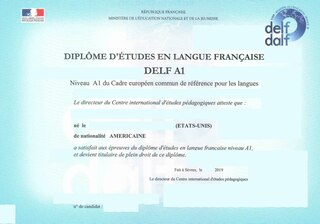
Riga State Gymnasium No.1, the oldest school in the Baltic states, offers secondary education in Riga, the capital of Latvia.
Cambridge Assessment English or Cambridge English develops and produces Cambridge English Qualifications and the International English Language Testing System (IELTS). The organisation contributed to the development of the Common European Framework of Reference for Languages (CEFR), the standard used around the world to benchmark language skills, and its qualifications and tests are aligned with CEFR levels.
B1 Preliminary, previously known as Cambridge English: Preliminary and the Preliminary English Test (PET), is an English language examination provided by Cambridge Assessment English, one of the examinations in the Cambridge English Qualifications.
The TestDaF, formally Test Deutsch als Fremdsprache, is a standardised language test of German proficiency for non-native German speakers. It aims at people who would like to study at, or academics and scientists who want to work in, German universities. The test is run by the TestDaF-Institut.

The Diplôme d'études en langue française or DELF for short, is a diploma of French-language abilities for non-native speakers of French administered by France Education International for France's Ministry of Education. It is composed of four independent diplomas corresponding to the first four levels of the Common European Framework of Reference for Languages: A1, A2, B1 and B2. Above this level, the "Proficient User" divisions are certified by the DALF.
C2 Proficiency, previously known as Cambridge English: Proficiency and the Certificate of Proficiency in English (CPE), is an English language examination provided by Cambridge Assessment English (previously known as Cambridge English Language Assessment and University of Cambridge ESOL examination).
B2 First, previously known as Cambridge English: First and the First Certificate in English (FCE), is an English language examination provided by Cambridge Assessment English (previously known as Cambridge English Language Assessment and the University of Cambridge ESOL examinations).
The Accademia Italiana di Lingua (AIL) is a professional association of schools, institutions and experts in the field of teaching Italian as a foreign language. They organise instruction and testing of students interested in having a diploma for Italian language studies. The AIL initiated the first diploma exams for the study of modern Italian.

The Test of Chinese as a Foreign Language is the Republic of China (Taiwan)'s standardized test of proficiency in ROC Standard Chinese for non-native speakers such as foreign students. It is administered by the Steering Committee for the Test Of Proficiency-Huayu (SC-TOP). The committee is under the direction of Taiwan's Ministry of Education. The test was formerly known as the TOP or Test Of Proficiency-Huayu.

Cağaloğlu Anatolian High School, in Cağaloğlu, İstanbul, is one of the oldest and internationally renowned high schools of Turkey. Istanbul Cağaloğlu Anatolian High School is considered to be an elite public high school in Turkey. The primary languages of instruction are Turkish and German. The secondary foreign language of instruction is English. Germany recognizes the school as a "Deutsche Auslandsschule".
The European Language Certificates are international standardised tests of ten languages.
A2 Key, previously known as Cambridge English: Key and the Key English Test (KET), is an English language examination provided by Cambridge Assessment English.
The Certificate Examinations in Polish as a Foreign Language, also referred as State Certificate Examinations in Polish as a Foreign Language, are standardized tests of Polish language proficiency for non-native Polish speakers. The examinations are held by the State Commission for the Certification of Proficiency in Polish as a Foreign Language starting from 2004 in Poland as well as in foreign countries. Candidates passing the examinations would obtain a certificate indicating the level of their proficiency in Polish. Through 2015, only three levels of examinations set according to the Common European Framework of Reference for Languages were available, namely, B1, B2 and C2. Following reforms initiated that year, certification is available for levels A1-C2 for adults and A1-B2 for children
The German School of Connecticut, also known as GSC, is a private nonprofit Saturday school founded in 1978 with a student body of 350. A professional teaching staff, most of whom are native German speakers, provide three contact hours on each of thirty Saturdays during the traditional September – May school year. Classes are held on two campuses: Stamford and West Hartford, for ages ranging from preschool to high school as well as adults. Students learn, improve or maintain German language skills while celebrating German, Austrian and Swiss cultures.
The Cambridge English Scale is a single range of scores used to report results for Cambridge English Language Assessment exams. It was introduced in January 2015, with Cambridge English Scale scores replacing the standardised score and candidate profile used for exams taken pre-2015. The scale aims to provide exam users with more detailed information about their exam performance than was previously available.

The international ECL examination system provides a standardised test-system customised to the languages of the EU member states and the EU candidate countries. The test-system is based on the recommendations of the Common European Framework of Reference (CEFR) and is operated by the European Consortium for the Certificate of Attainment in Modern Languages (ECL). The ECL is an association of institutions representing European languages.
The German International School Abu Dhabi is a German international school located in central Abu Dhabi, United Arab Emirates.

The Goethe-Schule Buenos Aires belongs to the Goethe School Association, a nonprofit Civil Association that brings together the parents of students. Since it is a German School Abroad (DAS), it is sponsored by the Federal Republic of Germany. It is a recognized cultural exchange school that teaches and promotes the German language. It is located in the town of Boulogne, in the province of Buenos Aires, 20 km north of the center of the City of Buenos Aires and includes three levels: kindergarten, primary school and secondary school. The school has more than 1500 students in the three levels. A fourth section of the school is the Humboldt Academy, an educational institution dedicated to teaching foreign languages, mainly German, where courses for adults and children are taught outside of the school’s regular classes.

Beverly Hills Schools (BHS) is a group of private schools in Sheikh Zayed City, Giza Governorate, Egypt, near Cairo. It includes an American School, a British School, and a German school.






